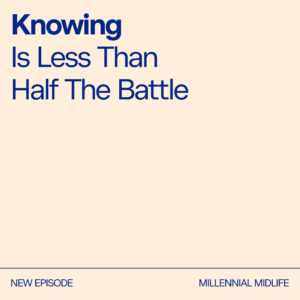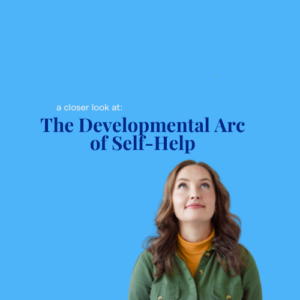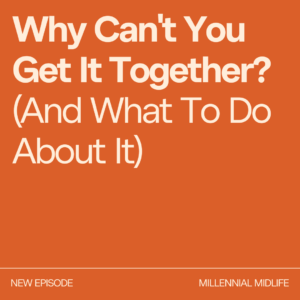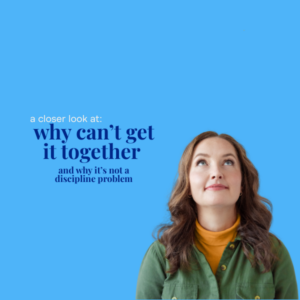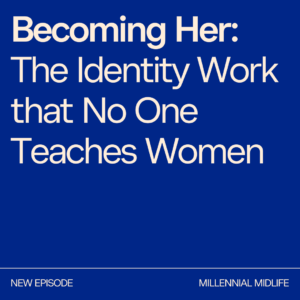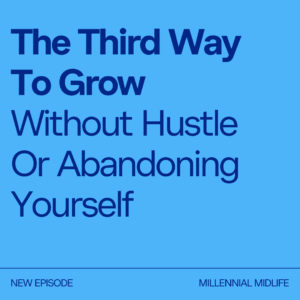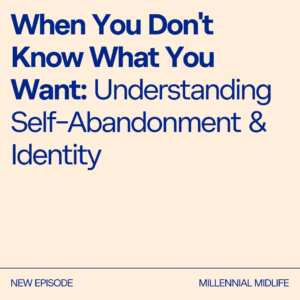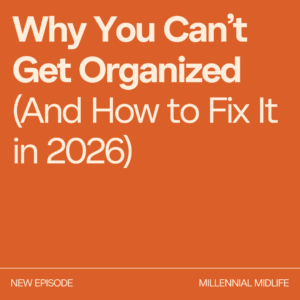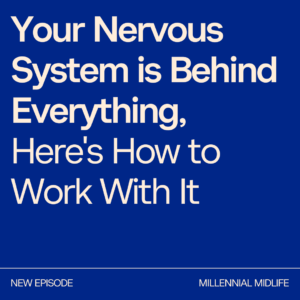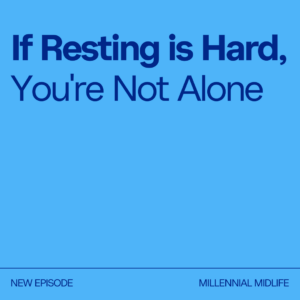Cecelia Baum Mandryk (00:01.784)
Hi and welcome to episode number four of Calmer Conversations. I’m Cecilia, let’s get started. Okay, over the next three episodes, I’m gonna cover three tools that I think are key in creating more calm in your life or making change in your life. And these are the three tools that I use over and over again with my clients and that I use every single day in my life. The three tools are awareness, acceptance and curiosity.
Today the topic is awareness. We’re gonna start at the beginning. And specifically non -judgmental or gentle observer type awareness. Now if you’ve ever been to a yoga class or read a book on mindfulness or done any kind of meditation, you’ve probably heard of awareness and gentle awareness or non -judgmental awareness. So it’s not a new concept to you. But here’s the thing about these concepts. They are simple. They’re not always easy.
They’re insanely effective, but they’re generally not shiny or in your face. So they don’t come across as this kind of magic pill type thing, but they really can be magic pill type things in your life. Right? So it’s easy to gloss over them because they feel so simple because it’s just like, awareness, whatever. But really, I want you to try and suspend that disbelief for today. I want you to try and maybe get curious about awareness and think
how it might change what you do and how you show up in your life. So these tools are all subtle, they’re effective, they’re life changing, and they’re nuanced. And there’s something that strangely enough, you have to practice. One of the things that I teach in the somatic sessions that I do in my programs is breathing. And I always think it’s so funny to say that I’m going to teach you breathing, right?
we’re all breathing. If you’re alive and you’re listening to this, you are breathing every day. And it sounds really silly to teach breathing. But if you think about it, something that that simple is that important to your life, sometimes it can be worth getting back to the basics. It can be worth understanding how doing something differently or more intentionally can actually change how you show up and what you do in your life. And so this is the same with awareness.
Cecelia Baum Mandryk (02:16.91)
Most people, and you might fall into this category, would say, I’m pretty aware of what I do day to day. Right, so if I met Cecilia 10 years ago, really before I started doing this work, and you asked me how aware I was in my life, I would have said like, oh, I’m totally aware. I’m totally aware of how I use my time. I’m really hyper aware of how I criticize myself and judge other people. I’m very aware of how I’m unhappy in my life. But the truth is, I wasn’t actually aware.
I didn’t have the deep understanding of awareness and the practice of awareness that I’m going to talk about today. So I don’t know you or I might not know you personally, I might know you personally, but you might again consider that, consider suspending that belief for the next 15 minutes or so as we talk about awareness, as we dive into this concept of awareness and we start thinking about it in a slightly different way so that you can start to use it as a tool in your life.
I mean, the cool thing about it being a simple tool is that you don’t really need anything special, right? You already have all the equipment you need to become more aware. You don’t need to really spend even that much time doing this, right? You don’t need to devote hours of your life to meditating or doing yoga or breathing. Really, you can have this intention to bring a more gentle awareness into your life, and you can actually see pretty radical changes just from that. Okay.
So you might be like me 10 years ago, feeling like you’re hyper aware of what’s happening in your life, but it’s possible, and I’m gonna say even probable, that you’re not. And this isn’t a knock on you. All it means is that you’re human, right? And that you’re a human with a brain that’s trying to conserve energy. And so your brain that receives so many pieces of information second to second has to prioritize. And so it sees something, but it doesn’t actually see it in that
It doesn’t actually see it as it is today in this moment. It sees your thoughts about it from your past conditioning. It sees your judgments about it that you’ve picked up from other people in your life, from society, et cetera. So it doesn’t actually see the thing. It sees your history with the thing. And that’s, again, one of those nuanced differences, right? So your current awareness of what’s happening in your life is clouded by your judgment.
Cecelia Baum Mandryk (04:35.488)
and your previous conditioning. And the previous conditioning being the most important thing because your previous conditioning even drives the judgments that you have right now. And again, this doesn’t mean that there’s anything wrong with you. Everybody does this. This is a totally normal human brain thing to do. And it’s even necessary for survival, I might put out there, because you to be aware, to be hyper aware in every single moment, to be seeing everything new in every single moment takes a lot of energy for your brain.
It takes a lot of presence and consciousness and time. And if your brain is trying to survive, if it’s worried about making sure you have enough food for the winter or that you have your mate or that your child is taken care of, then it’s really important that it not spend that much energy on these kinds of things. However, if you’re listening to this, I’m going to go ahead and guess that most of your needs are met in some way or another. And you actually do have some extra great brain capacity.
to use towards awareness. And the benefit is, is that when we bring a little bit of awareness back in, it allows changes in a really intentional way in our life. And it allows you to start making changes from that place of flow, from that place where you’re not using willpower, where you’re not using self -discipline, but you’re more relying on what’s happening in your brain. You’re reconditioning your brain. So you might also think of non -judgmental awareness as,
as starting to pave the path for the new neural pathways. So we talked about creating new neural pathways in some of the other episodes and how most of this work actually is reprogramming your conditioning that you have in your brain. Or if you liked the example of rewriting code in your brain, what we’re doing is we’re creating new neural pathways. We’re creating new ways of thinking, new types of awareness so that your brain has different judgments.
different conditioning that it’s using as a lens to reach to see the world. Okay, so the first point and just a kind of with love a place to start from is maybe even saying out loud to yourself and remember when I ask you to say these things out loud it’s because when you engage more you actually get something out of this episode and I’m hoping that you’re using this. I mean you can just listen to my voice if you love my voice I get comments all the time about that. But if you actually want to use this podcast to make changes in your life
Cecelia Baum Mandryk (06:55.466)
engaging with is really powerful. So saying out loud to yourself or maybe even just in your head, I’m not as aware as I think I am. Right now in my life, I probably don’t have a gentle or non -judgmental awareness of what I do day to day or moment to moment or instance to instance. And you might even set the intention then of I’m going to try this awareness thing. I’m going to see what actually shifts
when I become more aware in my life, I’m going to start to at least try to be more aware and bring in this non -judgmental thing, which we’re gonna start to define. Okay, so if you saw that to yourself, if you’ve admitted perhaps I’m not as aware as I think I am, and I’d like to be more aware, I have the intention of becoming more aware, that’s a really powerful place to
Right, having that openness, even just saying like, I’m curious about maybe what Cecilia saying about awareness and perhaps how it might apply to my life. Okay, bringing awareness to what you think is sort of like turning on a light in a messy closet or room. Suddenly you can see everything that’s there. And it doesn’t even have to be messy to be totally honest, right? Bringing awareness and non -judgmental present awareness to what’s happening is like turning a light on inside your brain.
Suddenly you get to see the lines of code and the past conditioning, the current neural pathways that are driving everything you think, everything you feel, everything you do. And this is such an empowered place to start making changes from because suddenly you see the root causes of what’s happening. Based on our episode last week, you even start to see your nervous system states, right? You start to see, I don’t feel safe in this moment.
with that non -judgmental awareness and then you start to be able to work with it. So it really is like shining lights in areas where you’ve been in the dark in your life. Those places where if you think, I’ve been trying to make change and I just can’t make it happen and I don’t know what’s wrong with me and I don’t know what’s happening, using awareness is crucial in those moments. If you wanna start making changes, it’s turning the light on so you can have the moment of, that’s what’s driving it.
Cecelia Baum Mandryk (09:15.308)
That’s what I think about this. This is where I feel unsafe. I have the aha. And then you can start to move from the aha through to actual different actions, right? Because aha, we don’t really want to stop at ahas. Ahas are amazing and I love having them. But also it’s nice to actually do something with them, right? Because how many of us have books or journals full of ahas and takeaways that we never do anything with? Quick aside. Okay, so the awareness is like turning on a light in your life.
in general, right? And I really think that that’s so true. And as I said, I still use these tools every single day, right? And when I become aware of what’s happening in my life, suddenly I am as the observer of what’s happening, I notice my own conditioning, I notice my own patterning and I get to work with it, right? Instead of it unconsciously or subconsciously driving everything that happens in my life. Cause that’s what’s happening when you’re in
All these thoughts are always happening. All these things are always running through your brain. This conditioning is always there. But if you’re not aware of it, if you don’t have this ability to see it and really see it, and we’ll talk about acceptance next week, but if you don’t have this ability to see it, then you can’t work with it. And it is then working you. It is the thing, these lines of code, these neural pathways, these past conditionings that you have because you’re a human living a human life.
are the things that will drive what happens in your life if you can’t pause and start to notice them. So that’s why awareness is important, right? Now that we’ve dived into exactly, or we’ve given the kind of reason why awareness is so important, now let’s go into kind of what it is more specifically and why you might even wanna try this in your life, right? Hopefully I’ve made that case for you why you might wanna consider it or use it as a tool for yourself.
So awareness, just the simple definition is knowledge or perceptu – Okay. So the simple definition of awareness is knowledge or perception of a situation or fact. Non -judgmental awareness is a mindfulness practice that involves being aware of what your brain does automatically. Okay. So the awareness is the knowledge of the perception or fact.
Cecelia Baum Mandryk (11:36.408)
The non -judgmental involves being aware of what your brain does automatically. So noticing when your brain automatically has a thought about something or has a judgment about yourself or a situation, plus the capacity to sit with your thoughts and sensations without reacting to them. So it’s this open awareness of what’s happening. It’s shining the light on it’s bringing your attention to a situation or a fact, a thought.
feeling, an emotional pattern in your body, it’s becoming aware of those. So it’s about observing and experiencing things without labeling them as good or bad, right or wrong, without needing to make sense of them, without trying to fix them, without trying to make anything specific happen. Simply resting in the observation space. And the other term that I use, so if non -judgmental awareness
And the term non -judgmental means not having an opinion about something, right, about what you’re observing. That doesn’t work for you. You might start with being a gentle observer. And a gentle observer is somebody, you know, if you think of like a narrator or a storyteller, or maybe even somebody like a security camera who’s narrating what they’re watching, they’re noting it without judging it. They’re noting it without needing to make anything specific happen. They’re simply seeing what is going on.
and in some ways documenting it, not just to document it, but to bring, shine a light on it. So when we notice something, when we observe it and become aware of it, and we don’t have the opinion, all we’ve done is shine a light on it. We’ve opened our eyes to that thing that is happening. You’re trying to see something. Another way that I frame this often for people and work that we do is to notice and to name.
Right, because nonjudgmental awareness like sounds, I don’t know, it sounds really good, but it’s kind of like, what does that even mean? But it’s to notice and name something, but to name it as objectively as possible, right? So you’re noticing I’m doing something and you name it and instead of naming it as good or bad or right or wrong or trying to do something else or it should be doing this or shouldn’t be doing that, you’re simply naming it without any of that, any of those other layers.
Cecelia Baum Mandryk (14:02.22)
And this can feel really weird the first couple of times you do it, particularly if, and I’m gonna include myself in this, like I had an opinion about everything for a very long time, what was right, what was wrong, what somebody should be doing, they shouldn’t be doing, how a situation should be or shouldn’t be. And so every time I had an observation, it came with a judgment. It came with a, this is how it should be, right, an interpretation. It’s a subjective awareness then. And what we’re working towards and why it can feel so weird at first,
And it can feel like almost a little scary sometimes because our egos feel really safe when we have a judgment around something. And what we’re trying to do is we’re naming it, we’re saying, I’m doing this or this is happening in my existence, right? Somebody’s doing something, it’s raining outside. I don’t know. Somebody’s saying something to their kid or to their dog or whatever it is. And then we have an opinion about
Right? I didn’t go for a walk. I’m a bad person. I ate cake after dinner and there’s something wrong with me. Right? Or something like that. I ruined my diet or I ruined whatever’s happening this week. We have something to say about it. We have a judgment and we’ll go into this next week, but essentially that puts us into resistance. We’re not accepting what’s happening. And so we’re just trying to see, we’re trying to notice a name. So for most of us, we might be observing, but the observation comes with that opinion. As I just said,
So you’re an opinion of yourself, an opinion of the other person, an opinion of the situation. What someone should be doing, shouldn’t be doing. And this is again, very, that way of operating is very natural because it helps your brain make decisions about survival. And so moving into this other space is actually feels clunky and it feels unusual, not because you haven’t, just because you haven’t been doing it.
But because it’s going a little bit against your brain’s energy conservation principles, which I went into a little bit earlier, right? How your brain wants to conserve energy. It’s supposed to have an opinion because those opinions help you fit in with the group that you’re around. They help you survive. They help you avoid danger. They help you create pleasure, et cetera. So this whole noticing and naming this gentle observing is a practice. Like I said, it can feel clunky at times. It can feel really weird. But
Cecelia Baum Mandryk (16:19.966)
If you practice it, so if you decide to do this, right, if you start to say, want to become more of a gentle observer, I want to hold things more lightly in my life, I want to watch what I’m doing because I want to change something in my life, I want to feel calmer, so I want to start to notice all the times I don’t feel calm. And I want to notice what’s happening in my brain.
when that’s going on, what are the stories that are happening? I want to be nicer to myself, so I’m going to start becoming aware of all the times I’m not nice to me, so that I can start to see what’s happening there. And in this way, you’re almost becoming a scientist in some ways, right? You’re watching yourself without interfering, without kind of messing with the experiment. You’re just watching what’s happening for a while. And the most amazing thing that can happen is
Sometimes just becoming aware, just noticing the thoughts that you have, the neural pathways that are currently there, the conditioning that is currently there, big shifts in life can happen just by seeing them. Right? Just by noticing how the thoughts or your conditioning or your current neural pathways are continuing to create the same outcome. And you have a choice there. You can make a change simply by the awareness. And this awareness, again, it’s so super powerful because you’re becoming aware of the root.
The thoughts you have drive almost everything that happens in your life. They drive the emotions that you feel, they drive the actions that you take, they drive how you interact with other people, they drive the results that you see day to day in your life, no matter what those are. And so when we become aware of the thoughts without judgment, we just start to notice the pattern. We notice what they create in our life.
then we can start to again work with them, right? So we’re continually moving towards this awareness, adding an acceptance and then curiosity. And we’re getting to this place of affirmative awareness or conscious awareness that doesn’t deny or blame. It simply said, this is the way that it is and that’s okay. This is what’s happening to my reality. This is the pattern that I’m in and that’s okay. I can accept that because that’s a reality right now. Then the curiosity comes in and says, from a place of groundedness, from a place of love,
Cecelia Baum Mandryk (18:35.182)
From a place of seeing my future highest self, is this serving me? What is it bringing into my life? Do I like what it’s bringing into my life? Noting, if I want to change this, can. I have the power now that I can see it to make a change. Do I wanna change it? How do I wanna change it? What else do I want to bring more of into my life? I have the responsibility for me.
And in my life, I can change the way I see things, I can change the way how things impress upon me, and when I change how I see things, I change my world. And that sounds huge, and I know that I just made this giant leap from like awareness to changing your world, but it really is that simple. And again, simple doesn’t mean easy, but simple can be extremely powerful. And so from this place of non -judgmental awareness, you get to notice exactly what’s happening in your life, and from a place of
of groundedness and love and empowerment, you get to decide how you want things to change going forward. If you want them to change, or you can say, actually really like this, this is working, right? So you can use this awareness to notice things that are working in your life too, right? And this is what this work is all about. This is how change happens. This is how you grow. This is how things shift in amazing, kind of almost unbelievable ways.
But I want you to remember that it’s a practice and it might be new for you. So it might feel clunky right now, it might feel weird right now, it might feel awkward and that’s totally okay. If you try to engage with this, you might also feel weird doing it and that’s also okay, right? That’s totally normal. But noting that it is a practice and that if you do want to bring it into your life, this is how you do it, right? I love experiments. I’m always trying different things in my own life. And I encourage you to take these tools and try them for yourself in your life, right? And not just once because like you don’t, that’s not
because it is a practice, you don’t just get to do it once. You have to commit to it for a period of time. Right, so you might pick an activity or a relationship or an emotion in your life. Like I gave the instance of I wanna feel calmer, so I’m gonna notice all the times I don’t feel calm. I’m struggling with a relationship with my colleague, and so I’m gonna bring my awareness to that relationship. Or I really wanna start working out and I’m not doing it, so I’m gonna bring my awareness to that activity. I procrastinate a lot, I wanna bring my awareness there. And I’m gonna do it for the next month.
Cecelia Baum Mandryk (20:50.382)
Right, and what I’m committing to doing is anytime I engage with this emotion or this person or this activity, I’m going to intentionally slow my thoughts down. I’m gonna start to name them and notice them. I’m gonna start to become aware of what is happening in my brain, not with judgment, not trying to change anything or fix anything, but just so I can become aware. Right, so you might say, I’m gonna bring awareness to my interactions with my colleague for the next 30 days, or when I…
say I’m gonna work out or I’m gonna bring my awareness to procrastination for the next 30 days. And next week we’ll go into acceptance, which is the next step of this. But it’s your job, if you wanna use this, if you wanna start seeing changes in your life, is to say, this is what I’m committed to doing. This is my intention and I’m naming it out loud for myself. And this is why I wanna do it. This is why it’s important to me. And then start to see what happens when you simply become aware of what’s going on in your life.
You start to notice the thoughts you have, notice the neural pathways, notice the conditioning, notice the thoughts. You’ll start to notice that you see, you know, it’s like something your mom said or like a teacher said that comes up over and over. And you’re like, I know exactly where that came from. I didn’t even notice that I was telling myself what’s wrong with you. That was from a current client or somebody who’s working in one of my groups. They’re like, when we talked about this awareness, suddenly I became aware.
of I say to myself over and over again, what’s wrong with you? And that’s something my mom said to me all the time and they didn’t even know that I was saying that. I didn’t even know the impact it was having on my life. But now I know, now I can start to see it every single time I say it and I can start to ask myself, do I really wanna talk to myself that way? What is this bringing into my life? How can I change it? Okay, so all about acceptance, I mean awareness. We’re gonna talk about acceptance next week. I bet you didn’t think.
think that I could talk for over 22 minutes about acceptance. Wait, I bet that you didn’t think I could talk for over 22 minutes about awareness, but really this is even just the tip of the iceberg about awareness. It is one of the most critical tools in your toolbox. If you can build this, you’re laying a foundation for this work and for making changes in your life now, but forevermore. Okay, thank you so much for tuning in, sending lots of love, and I will talk to you next time.




